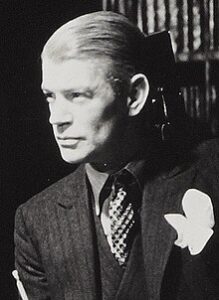James Whale
Dudley born Hollywood film director James Whale (1889-1956) is best remembered today for two iconic and classic films of the horror genre: Frankenstein (1931) and The Bride of Frankenstein (1935). Honest if not outspoken about his homosexuality, the fact he lived openly with another man for 23 years did not seem to affect his career or reputation. During the First World War, long before his move to Hollywood, he spent time in Bristol and forged a friendship which was to endure for 25 years, and he made many return visits to the city.
Early in 1916 Whale was stationed in Bristol and billeted with No.3 Battalion at the former Deaf and Dumb Institute building on the corner of Elmdale Road and Queen’s Avenue, Tyndall’s Park (now the site of an office block). The cadets drilled daily on Elmdale Road and, on a winter’s day, a couple took pity on one particular cold looking young man and invited him into their house for a warming cup of cocoa. 26 year-old James Whale was befriended by Arthur and Maria Wills who lived at 20 Elmdale Road. Over the coming months they regularly welcomed James into their home.
Arthur Wills was in his 60s and a son of the “H.O” (Henry Overton Wills) of Bristol tobacco manufacturers, W.D & H.O Wills. It is not hard to see why the young James Whale became in some ways a surrogate son; only two months earlier their own son, Michael, had died of wounds at Ypres, Belgium, aged 21.
In the summer of 1916 Whale was promoted to second lieutenant and posted to Flanders. He saw action at Passchendale in the spring of 1917. In August he was taken prisoner and sent to Holzminden POW camp in Germany where he spent the rest of the war. It was here that Whale became involved in producing highly successful amateur theatricals which proved to be the beginning of his creative stage and film career.
After the war he became an actor and in 1919 played several small roles in a provincial touring production of John Drinkwater’s play Abraham Lincoln. The tour took Whale to Bristol again in June 1921 when he played the part of Lincoln’s secretary, John Hay, at The Prince’s Theatre, Park Row, and stayed with the Wills in Elmdale Road during the week run of the play.
In 1925 Whale designed the set for the first production of the play Prisoners of War by J.R. Ackerley which has been called “the first twentieth century play produced upon the London or Broadway stage to deal with homosexual desire”. The central theme of the play is the longing of Captain Conrad (based on Ackerley himself) for attractive 19 year old Lieutenant Grayle and includes the line spoken by Conrad “The fair sex? And which sex is that?”. The play would have definitely spoken to Whale as a story of repressed and forbidden gay desire.
In 1928 Whale was again set designer and also directed the first production of R.C. Sherriff’s classic play of the First World War Journey’s End. It was to achieve great acclaim on Broadway, in touring productions, and as a 1930 film.
James Whale again stayed with the Wills in May 1930 while in England to direct R.C. Sherriff’s new play Badger’s Green. An article in the Western Daily Press on May 21st was headed “THE PRODUCER OF ‘JOURNEY’S END’ STAYS IN BRISTOL”. He told the reporter how on “one bitterly cold morning“ when he was a cadet in Clifton during the war Maria Wills had given him a cup of cocoa. “Many kindnesses of one sort or another were shown”…. and despite his success, James Whale always visits the Wills when in England”. Whale told the reporter he earned seven pence a day as a cadet in Bristol, and his last film job had earned him £500 a week!
In 1929 Whale met Hollywood film producer David Lewis (1903-1987) and they lived openly as a couple for 23 years. Lewis was a prominent film producer in the 1940s and 50s.
In 1931 James Whale directed what would become a classic of Hollywood horror, Frankenstein, with Camberwell born Boris Karloff as The Monster and Colin Clive as Dr Frankenstein delivering the classic line “It’s alive! It’s alive!”.
Whale was interviewed again in the summer of 1932 while “paying a flying visit to an old friend, Mr Arthur Wills, who befriended him in his cadet days during the war”. The article appeared in the Western Daily Press on August 31st 1932 under a photograph of himself and the headline “MEET MR JAMES WHALE FROM HOLLYWOOD”. The report noted that “Frankenstein …. had made him famous“ and went on to say ”A man who is famous all over the globe walked the streets of Bristol yesterday entirely unrecognised”.
In 1935 Whale directed The Bride of Frankenstein, regarded by many as his masterpiece. Because of its perceived ‘gay sub text’ the film is often considered as a ‘camp classic’, particularly because of the performance of Chelsea born Ernest Thesiger as Dr Pretorious. Whale liked to employ actors and film crew to work on his films who were either British, gay, or both. In Bride, Colin Clive (believed to be bisexual ) reprised his role as Henry Frankenstein; Thesiger was bisexual.
Arthur Wills died aged 90 in January 1940. The Bristol Evening Post obituary noted James Whale “looked upon Mr Wills as a personal friend and never failed to pay him a visit when in England. Even when on a flying visit from Hollywood one of his calls was invariably to his old friend who had been a host to him during the Great War”.
While in Paris in spring of 1952, 63 year-old Whale became infatuated with Pierre Fogel, a 25 year-old French bartender who could barely speak English. Whale returned to California in November and told David Lewis that Foegel would be moving into the house they had shared for over 20 years. Lewis walked out and their relationship was over. Foegel was with Whale until his death.
Although Whale could not swim he had a swimming pool built at his home and enjoyed ogling the bronzed handsome young men who attended his all-male “pool parties”. After a series of strokes in 1956 which resulted in pain, depression and diminishing mental faculties, Whale drowned himself in the swimming pool on May 29th 1957 aged 67. Although separated, Whale and Lewis had remained close friends and Lewis kept Whale’s suicide note until his own death 30 years later.
In 1998 Sir Ian McKellen played Whale in Gods and Monsters, a fictionalised version of Whale’s final years.
Today 20 Elmdale Road is occupied by offices and the house goes unnoticed, no one knowing it was once the homely refuge for a young officer cadet and was frequently visited when that young man had become one of the greatest film directors of the twentieth century, who was also openly gay in an age very unlike our own.
Jonathan Rowe 2021
For further information about James Whale see https://en.wikipedia.org/wiki/James_Whale.
James Whale: A New World of Gods and Monsters by James Curtis (1998).
Click here for a longer version of this article (pdf).


